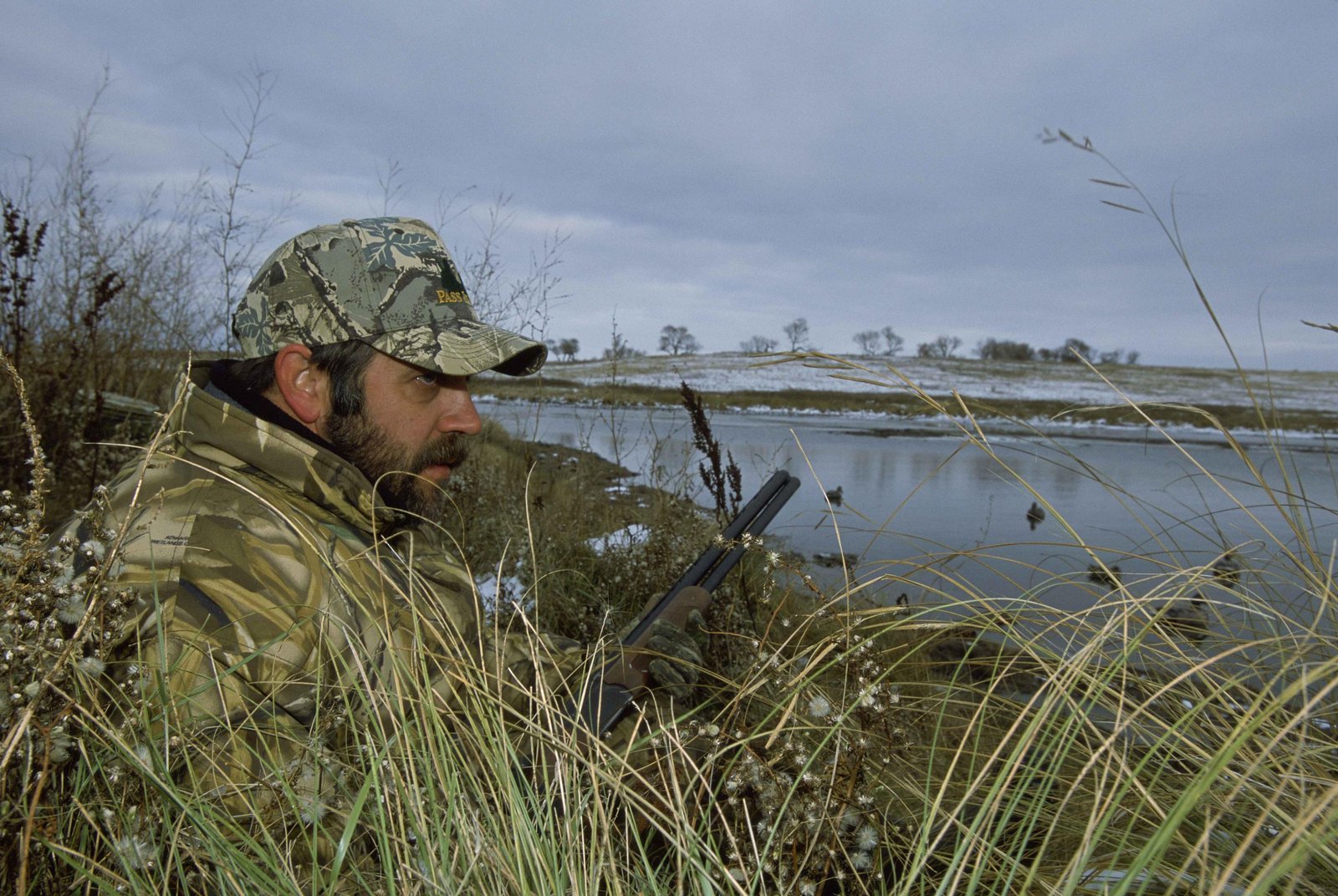Hidden in plain sight, blending seamlessly with their surroundings, an array of creatures possess a remarkable secret weapon in the world of hunting: camouflage. From the cunning chameleons of the rainforests to the elusive Arctic foxes, nature has endowed countless species with the remarkable ability to disappear into their environment. This ancient evolutionary trait, often synonymous with stealth and deception, plays a vital role in the lives and survival of myriad hunted and hunter alike. Today, we embark on a voyage to explore the enchanting world of camouflage in hunting, unearthing its significance, stunning adaptations, and the intricate dance between predator and prey. As we delve into the depths of this silent art, a multitude of questions arise. What is the true importance of camouflage? How does this ability influence the survival rates of countless species? And how does it shape the strategies employed by hunters themselves? Prepare to be captivated by the invisible wonders that lie beneath the surface of the natural world.
Table of Contents
- The Power of Blending In: Understanding the Significance of Camouflage in Hunting
- Unveiling the Science behind Camouflage: Exploring How It Enhances Hunting Efficiency
- Mastering the Art of Concealment: Tips and Techniques for Using Camouflage Effectively in Hunting
- Gear Up for Success: Choosing the Right Camouflage Patterns and Equipment for Hunting
- Mastering the Environment: Adapting Camouflage to Different Hunting Seasons and Terrains
- Q&A
- To Conclude

The Power of Blending In: Understanding the Significance of Camouflage in Hunting
Camouflage, a hunter’s best friend and a natural marvel, holds the power to revolutionize the hunting experience. Understanding the significance of blending in seamlessly with the environment is essential for every hunter. Through the art of camouflage, hunting enthusiasts gain the upper hand, becoming one with nature and unlocking the key to success.
The benefits of camouflage in hunting are undeniable:
- Concealment: Camouflage allows hunters to blend into their surroundings, disguising their presence and reducing the likelihood of detection by game animals. By seamlessly merging with the natural environment, hunters can diminish their visibility to prey, giving them a distinct advantage.
- Improved Stealth: Camouflage plays a crucial role in breaking up the hunter’s silhouette, making it easier to move undetected. By masking their presence, hunters can navigate quietly through the wilderness, avoiding alarming any potential prey.
- Enhanced Focus: When hunters blend in with nature, their senses heighten, allowing them to absorb the sights and sounds of the wilderness without alarming the animals they seek to hunt. This harmonious integration creates an intimate connection, granting hunters the ability to anticipate animal movement and behavior.
In conclusion, camouflage is an invaluable asset to any hunting expedition, providing hunters with a powerful tool, empowerment, and a deeper understanding of the natural world. By embracing the art of blending in, hunters tap into the vast array of benefits that camouflage offers, ultimately leading to a gratifying and successful hunting experience.

Unveiling the Science behind Camouflage: Exploring How It Enhances Hunting Efficiency
Camouflage, the art of blending into one’s surroundings, has long fascinated scientists and outdoor enthusiasts alike. But what exactly is the science behind this remarkable ability? In this post, we delve into the secrets of camouflage and its undeniable role in enhancing hunting efficiency.
At its core, camouflage works by exploiting the visual cues that prey species rely on to detect potential threats. By using a combination of color, pattern, and texture, animals can effectively disappear into their environment, making it difficult for predators to spot them. This incredible adaptation enables hunters to get closer to their targets without triggering alarm or evading detection.
Camouflage techniques in the animal kingdom are as diverse as the species that employ them. Some animals, like chameleons, possess the extraordinary ability to change the color of their skin, adapting to different backgrounds in real-time. Others, such as the snow leopard, have evolved fur patterns that mimic the dappled sunlight and shadows found in mountainous regions. The science behind these adaptations is a captivating field of study, encompassing biology, optics, and evolutionary theory.
Understanding the intricacies of camouflage not only deepens our appreciation for the natural world but also provides valuable insights for hunters and wildlife photographers. By studying the effectiveness of different camouflage strategies and recognizing the environmental cues that animals rely on, we can enhance our hunting techniques and capture breathtaking wildlife imagery without disturbing the delicate balance of nature.

Mastering the Art of Concealment: Tips and Techniques for Using Camouflage Effectively in Hunting
Tips and Techniques for Mastering the Art of Concealment in Hunting
In the thrilling pursuit of game, being elusive and unseen can make all the difference. To successfully blend into the natural surroundings and become one with the environment, mastering the art of camouflage is essential. Here are some expert tips and techniques to help you achieve maximum effectiveness with your concealment tactics.
- Select the right camouflage: Choose the pattern and colors that closely resemble the surroundings in your hunting area. Keep in mind the season, terrain, and vegetation. Whether it’s a lush forest, open fields, or snowy mountain peaks, picking the right camo will greatly enhance your chances of remaining hidden.
- Break up your silhouette: Avoid presenting a recognizable human shape by using natural elements. Incorporate branches, leaves, or vegetation into your gear or clothing. Breaking up your silhouette will make it harder for game to detect your presence, especially during critical moments when you need to remain motionless and undetected.
- Blend movement with the surroundings: In addition to proper camo attire, practice slow and deliberate movement. Use the environment to your advantage by moving when the wind rustles the leaves or when animals are preoccupied with their own activities.
- Conceal your scent: Animals have a keen sense of smell, so it’s important to address your scent as part of the camouflage strategy. Consider using scent-blocking products, washing your gear with unscented detergents, and avoiding strong odors in your hunting area.
- Opt for natural camo face paint: When it comes to concealing your face, opt for hypoallergenic camouflage face paint instead of masks that can obstruct your vision or cause discomfort. By matching your skin tone with the natural hues of your hunting environment, you’ll eliminate any areas of exposed skin that may give you away.
With these tips and techniques, you’ll be one step closer to becoming a master of concealment on your hunting expeditions. Remember, patience and attention to detail are key. By becoming one with nature, you’ll increase your chances of a successful and fulfilling hunting experience in the great outdoors.
Gear Up for Success: Choosing the Right Camouflage Patterns and Equipment for Hunting
When it comes to hunting, blending seamlessly into your surroundings is key. Choosing the right camouflage patterns and equipment can significantly improve your chances of success in the field. Here are some factors to consider when gearing up for your next hunting adventure:
- Environment: Assess the landscape and foliage prevalent in your hunting area. Consider the patterns and colors that closely mimic your surroundings. For dense forests, opt for patterns with deep greens, browns, and earth tones. In open fields or grasslands, choose patterns with lighter greens and tan. Match your camouflage to the specific environment to enhance your concealment.
- Season: Different seasons demand different camouflage patterns. Adapt your gear to the changing surroundings throughout the year. Opt for patterns that mimic the colors of each season, such as vibrant greens for spring, rich browns for autumn, or snowy whites for winter. Adapting to the seasonal variations will increase your tactical advantage.
- Quality Equipment: While camouflage clothing is essential, don’t forget other critical gear like hats, gloves, face paint, and even rifle covers. Ensure your equipment complements the selected camouflage patterns and helps you remain undetectable in the wild. Additionally, invest in high-quality hunting gear made from durable materials that withstand rough terrains and adverse weather conditions.
By carefully considering your hunting environment, the current season, and acquiring the right equipment, you can ensure optimal concealment during your outdoor pursuits. Remember, choosing the right camouflage is not only practical, but also adds a touch of excitement to your hunting experience.
Mastering the Environment: Adapting Camouflage to Different Hunting Seasons and Terrains
As an avid hunter, understanding the importance of adapting camouflage to different hunting seasons and terrains is crucial. Camouflage not only helps you blend in with your surroundings, but it also increases your chances of a successful hunt. With each season and terrain presenting its own unique challenges, mastering the art of camouflage will greatly enhance your hunting experience.
When it comes to different hunting seasons, it’s essential to consider the changing colors and textures of the environment. In the vibrant hues of autumn, incorporating camouflage with rich earthy tones would be ideal. Utilize patterns that mimic the changing foliage, such as brown, orange, and green. For the winter season, opt for camouflage patterns that blend with the snowy backdrop, such as whites and grays. Spring and summer call for patterns that mimic lush vegetation and vibrant flowers, like shades of green and hints of yellow or pink.
Similarly, adapting camouflage to various terrains is vital for success in different hunting environments. In dense forests, choose camouflage that mimics tree bark, leaves, and shadows. Incorporate deep browns, greens, and blacks to effectively conceal yourself. When hunting in open fields or grasslands, opt for patterns with lighter shades of brown and green, resembling tall grasses and hay. In rocky terrains, consider patterns with earthy tones like brown and gray to seamlessly blend with the rugged backdrop.
- Research the specific hunting season and its surrounding environment to identify the predominant colors and textures.
- Choose camouflage patterns that match the natural elements of the environment, whether it’s the changing foliage or the terrain.
- Ensure your camouflage blends well with the surroundings to avoid detection and increase your chances of a successful hunt.
By considering both the hunting season and the terrain, you can adapt your camouflage effectively, giving yourself an edge and increasing your chances of success in the field. Remember, mastering the environment through camouflage requires careful attention to detail and a deep understanding of your surroundings.
Q&A
The Importance of Camouflage in Hunting
Why is camouflage important in hunting?
Camouflage is crucial in hunting as it helps hunters blend into their surroundings, making them less visible to prey. By concealing their presence, hunters can get closer to their target and increase their chances of a successful hunt.
Does camouflage really make a difference in hunting success?
Absolutely! When hunters wear effective camouflage, it allows them to hide in plain sight, giving them an advantage over their prey. This increased stealth significantly improves their chances of making accurate shots and closing the distance with their target.
What elements should one consider when choosing camouflage?
When selecting camouflage, it’s important to consider the hunting environment and season. Optimal camouflage should match the colors and patterns of the hunting location, whether it’s dense forest or open fields, to effectively disguise the hunter.
Are there any specific patterns or colors that work best for camouflage in hunting?
There are various camouflage patterns designed for specific environments, including woodland, desert, or snow. It’s best to match the pattern and colors to the surroundings you’ll be hunting in. Earthy tones and natural patterns typically blend well in most hunting scenarios.
Does camouflage have any impact on animal behavior?
Camouflage can influence animal behavior to some extent. Animals are less likely to detect hunters who blend in with their environment, reducing their tendency to flee or remain on high alert. However, other factors, such as movement and scent, also play significant roles in animal detection.
What are some additional benefits of wearing camouflage during a hunt?
Aside from improved stealth, wearing camouflage can protect hunters from minor injuries, such as scrapes or scratches, by providing an extra layer of protection against rough terrain and vegetation. Additionally, camouflage clothing often has practical features like pockets for storing essential hunting gear.
Is it necessary for every hunter to wear camouflage?
While it may not always be mandatory, wearing camouflage is highly recommended for hunters seeking optimal success. The ability to blend into the environment offers a significant advantage, increasing the chances of staying undetected and making a successful kill.
To Conclude
As we bring an end to our discussion on the importance of camouflage in hunting, let us marvel at the remarkable dance between concealment and success. Like a master magician, the art of camouflage weaves its spell, transforming the hunter into a mere whisper, a shadow blending harmoniously with nature’s symphony.
In the grand theater of the wild, where humans become but guests, it is the invisible cloak of camouflage that acts as our silent ally. From the vibrant threads of deception woven within our attire to the subtle artistry of makeup on our skin, we pay homage to the ingenious ways we deceive our prey.
Nature, in her wisdom, has gifted every creature with unique characteristics that serve as a shield against the predator’s gaze. From the graceful stripes of a majestic tiger to the subtle pixelated patterns on a northern pike, camouflage is the universal language of survival.
But for the ardent hunter, camouflage is more than just a means to secure a trophy. It draws us closer to the wild, allowing us to penetrate the secret chambers of a parallel realm. In our quest for sustenance, it is imperative to become one with the environment, to merge our existence with the tapestry of nature itself.
As we lay in wait, silently observing the ebb and flow of life before us, we uncover a profound truth - camouflage is not merely about deception, it is about respect. Respect for the delicate balance that sustains the interconnected web of life. Respect for the prey that fuels our ancient instincts. And respect for the dance of survival that we, as hunters, are privileged to participate in.
So, as we prepare to embark on our next journey, let us never underestimate the power of camouflage. It is the embodiment of patience, subtlety, and understanding. May it forever be our silent accomplice, bestowing upon us the ability to unlock the secrets of the wild and ultimately, preserving the harmony between predator and prey.
As an affiliate, my content may feature links to products I personally use and recommend. By taking action, like subscribing or making a purchase, you’ll be supporting my work and fueling my taco cravings at the same time. Win-win, right?
Want to read more? Check out our Affiliate Disclosure page.